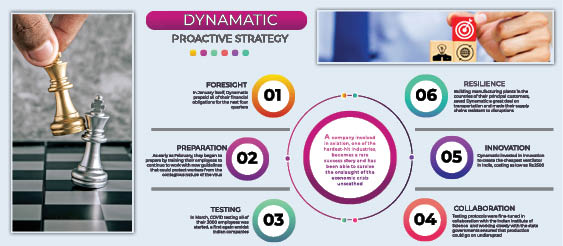Surviving and Thriving in the Pandemic
August 18, 2020 | Expert Insights

Udayant Malhoutra, CEO and MD of Dynamatic Technologies Ltd was a panellist In the 81st Synergia Forum’s 17th Virtual Forum on Supply Chain & Core Resilience Capabilities. This article is based on his views expressed during the discussions.
“It's a really challenging moment [...] For risk mitigation, and to have that sole supply dependency of the big OEMs on us, we had local manufacturing [...] In a sense, that business was not really disrupted (because of this)”
The pandemic has proved highly disruptive to the Indian economy, and resulted in estimates that this would be the worst recession since the economic liberalization of the 1990s, and possibly even since Indian Independence. 140 million people lost their jobs, while many more endured salary cuts[1]. Up to 53% of businesses were projected to be significantly affected, while several companies had their operations temporarily suspended or reduced[2]. Many smaller companies were forced to shut down due to a lack of funding caused by the pandemic.
In this dystopian situation, very few companies have been able to survive the onslaught of the economic crisis unscathed. Even fewer were not a part of the industries that saw an increase in demand due to the pandemic (such as facemasks, sanitizer, etc.). It seems almost unfathomable that a company involved in aviation, one of the hardest-hit industries, could become a rare success story.

PROACTIVE AND INNOVATIVE MEASURES
Dynamatic’s decision to manufacture their products locally turned out to be the correct one under the current circumstances. As a producer of high tech equipment for several aviation majors, their demand is of a global nature. They built their manufacturing plants in the countries of their principal customers, saving a great deal on transportation. While this also meant a possible loss due to paying higher wages (than if they were manufacturing in China) and due to economies of scale, it made their supply chains resilient to disruptions. Spreading manufacturing over different countries is rare, but it can serve as a reliable hedge against disruptions in the supply chain.
Dynamic is a sole supplier for certain products to major companies, like Boeing. In Udayant Malhoutra’s own words, 'being a sole supplier means risk'. Any disruption has the potential to cripple an entire company ahead of them in the supply chain. Accordingly, the sole supplier has to be responsive and proactive if it wishes to survive in the industry, especially when confronted with disruption as destructive as the pandemic.
TAKING CARE OF SUPPLIERS, CUSTOMERS & WORKERS
Sensing the potential for disruption, in January itself, Dynamatic prepaid all of their financial obligations for the next four quarters. As early as February, they began to prepare (sooner than many governments) by training their employees to continue to work with new guidelines that could protect workers from the contagious nature of the virus. In March, COVID testing all of their 3000 employees was started, a first again amidst Indian companies. In collaboration with the Indian Institute of Science to develop testing protocols were fine-tuned and working closely with the state governments, it was ensured that production could go on undisrupted. They even invested in innovation to create the cheapest ventilator in India, costing as low as Rs.2500. As a result, they have managed to emerge from the crisis not just intact, but indeed better than many of their competitors. They were able to survive without the aid of the Reserve Bank of India, while ensuring the safety and security, in terms of health and finances, of their customers and their employees.
The story of Dynamatic and of Udayant Malhoutra is a unique one. Their ability to mitigate risk, both before and during the current crisis, as well as their culture of innovation, can serve as a blueprint for others that wish to survive the next economic crisis.
“It's a really challenging moment... For risk mitigation, and to have that sole supply dependency of the big OEMs on us, we had local manufacturing... In a sense, that business was not really disrupted (because of this)"
Author: Synergia Foundation Research Team








Comments